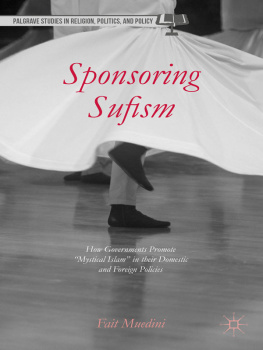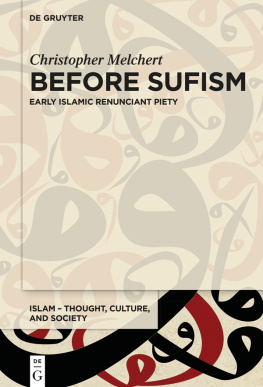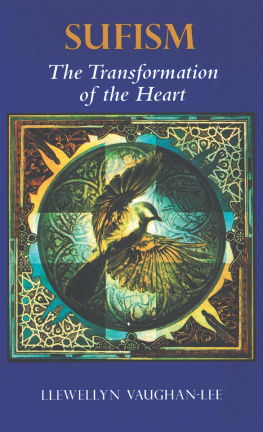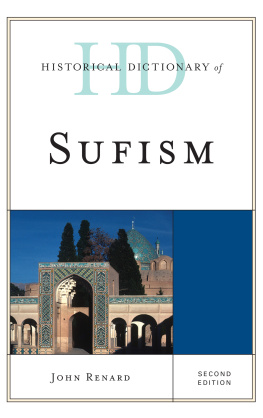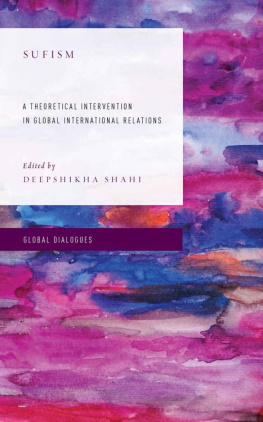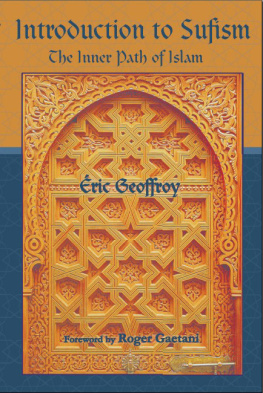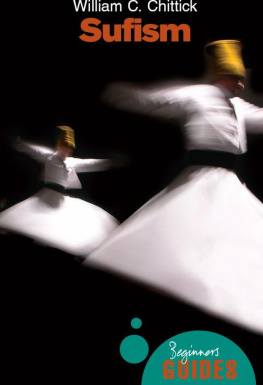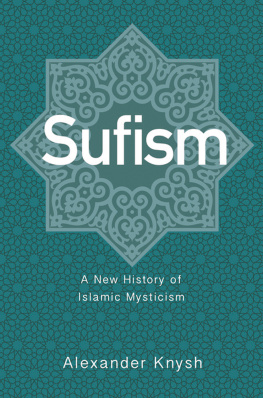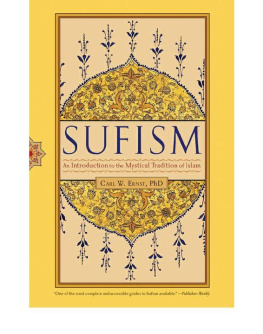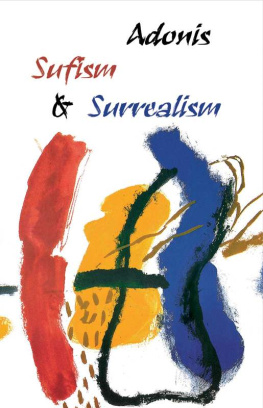Fait Muedini - Sponsoring Sufism
Here you can read online Fait Muedini - Sponsoring Sufism full text of the book (entire story) in english for free. Download pdf and epub, get meaning, cover and reviews about this ebook. year: 2015, publisher: Palgrave Macmillan, genre: Politics. Description of the work, (preface) as well as reviews are available. Best literature library LitArk.com created for fans of good reading and offers a wide selection of genres:
Romance novel
Science fiction
Adventure
Detective
Science
History
Home and family
Prose
Art
Politics
Computer
Non-fiction
Religion
Business
Children
Humor
Choose a favorite category and find really read worthwhile books. Enjoy immersion in the world of imagination, feel the emotions of the characters or learn something new for yourself, make an fascinating discovery.
- Book:Sponsoring Sufism
- Author:
- Publisher:Palgrave Macmillan
- Genre:
- Year:2015
- Rating:3 / 5
- Favourites:Add to favourites
- Your mark:
- 60
- 1
- 2
- 3
- 4
- 5
Sponsoring Sufism: summary, description and annotation
We offer to read an annotation, description, summary or preface (depends on what the author of the book "Sponsoring Sufism" wrote himself). If you haven't found the necessary information about the book — write in the comments, we will try to find it.
Sponsoring Sufism — read online for free the complete book (whole text) full work
Below is the text of the book, divided by pages. System saving the place of the last page read, allows you to conveniently read the book "Sponsoring Sufism" online for free, without having to search again every time where you left off. Put a bookmark, and you can go to the page where you finished reading at any time.
Font size:
Interval:
Bookmark:
Palgrave Studies in Religion, Politics, and Policy
Series Editors: Ted G. Jelen and Mark J. Rozell
A generation ago, many social scientists regarded religion as an anachronism, whose social, economic, and political importance would inevitably wane and disappear in the face of the inexorable forces of modernity. Of course, nothing of the sort has occurred; indeed, the public role of religion is resurgent in US domestic politics, in other nations, and in the international arena. Today, religion is widely acknowledged to be a key variable in candidate nominations, platforms, and elections; it is recognized as a major influence on domestic and foreign policies. National religious movements as diverse as the Christian Right in the United States and the Taliban in Afghanistan are important factors in the internal politics of particular nations. Moreover, such transnational religious actors as Al-Qaida, Falun Gong, and the Vatican have had important effects on the politics and policies of nations around the world.
Palgrave Studies in Religion, Politics, and Policy serves a growing niche in the discipline of political science. This subfield has proliferated rapidly during the past two decades, and has generated an enormous amount of scholarly studies and journalistic coverage. Five years ago, the journal Politics and Religion was created; in addition, works relating to religion and politics have been the subject of many articles in more general academic journals. The number of books and monographs on religion and politics has increased tremendously. In the past, many social scientists dismissed religion as a key variable in politics and government.
This series casts a broad net over the subfield, providing opportunities for scholars at all levels to publish their works with Palgrave. The series publishes monographs in all subfields of political science, including American Politics, Public Policy, Public Law, Comparative Politics, International Relations, and Political Theory.
The principal focus of the series is the public role of religion. Religion is construed broadly to include public opinion, religious institutions, and the legal frameworks under which religious politics are practiced. The dependent variable in which we are interested is politics, defined broadly to include analyses of the public sources and consequences of religious belief and behavior. These would include matters of public policy, as well as variations in the practice of political life. We welcome a diverse range of methodological perspectives, provided that the approaches taken are intellectually rigorous.
The series does not deal with works of theology, in that arguments about the validity or utility of religious beliefs are not a part of the series focus. Similarly, the authors of works about the private or personal consequences of religious belief and behavior, such as personal happiness, mental health, or family dysfunction, should seek other outlets for their writings. Although historical perspectives can often illuminate our understanding of modern political phenomena, our focus in the Palgrave Studies in Religion, Politics, and Policy series is on the relationship between the sacred and the political in contemporary societies.
The Catholic Church in Polish History: Politics, Religion, and Cultural Resistance
By Sabrina P. Ramet
Global Religions and International Relations: A Diplomatic Perspective
By Pasquale Ferrara
Beyond Religious Right and Secular Left Rhetoric: The Road to Compromise
By Karin Fry
Christianity in Chinese Public Life: Religion, Society, and the Rule of Law
Edited by Joel A. Carpenter and Kevin R. den Dulk
Mitt Romney, Mormonism, and the 2012 Election
By Luke Perry
Clerical Sexual Abuse: How the Crisis Changed US Catholic ChurchState Relations
By Jo Renee Formicola
Mediating Religion and Government: Political Institutions and the Policy Process
Edited by Elizabeth A. Oldmixon and Kevin R. den Dulk
Presidential Faith and Foreign Policy: Jimmy Carter the Disciple and Ronald Reagan the Alchemist
By William Steding
Politicization of Religion, the Power of Symbolism: The Case of Former Yugoslavia and its Successor States
Edited by Gorana Ognjenovi and Jasna Jozeli
Politicization of Religion, the Power of State, Nation, and Faith: The Case of Former Yugoslavia and its Successor States
Edited by Gorana Ognjenovi and Jasna Jozeli
Worldview of Redemptive Violence in the US
By Wayne Lavender
Faith-Based Organizations at the United Nations
By Jeffrey Haynes
Sponsoring Sufism: How Governments Promote Mystical Islam in Their Domestic and Foreign Policies
By Fait Muedini
Sponsoring Sufism
How Governments Promote Mystical Islam in Their Domestic and Foreign Policies
Fait Muedini


SPONSORING SUFISM
Copyright Fait Muedini, 2015.
All rights reserved.
Book contains excerpts from The Promotion of Sufism in the Politics of Algeria and Morocco, Muedini, Fait, Islamic Africa, Vol. 29, No. 3, pages 201226. Northwestern University Press.
First published in 2015 by
PALGRAVE MACMILLAN
in the United Statesa division of St. Martins Press LLC,
175 Fifth Avenue, New York, NY 10010.
Where this book is distributed in the UK, Europe and the rest of the world, this is by Palgrave Macmillan, a division of Macmillan Publishers Limited, registered in England, company number 785998, of Houndmills, Basingstoke, Hampshire RG21 6XS.
Palgrave Macmillan is the global academic imprint of the above companies and has companies and representatives throughout the world.
Palgrave and Macmillan are registered trademarks in the United States, the United Kingdom, Europe and other countries.
ISBN: 9781137521064
Library of Congress Cataloging-in-Publication Data is available from the Library of Congress.
A catalogue record of the book is available from the British Library.
Design by Newgen Knowledge Works (P) Ltd., Chennai, India.
First edition: July 2015
10 9 8 7 6 5 4 3 2 1
To Kaltrina, Edon, Dua, and to my parents, Atli and Mudzefer Muedini
Contents
Acknowledgments
I want to thank my wife, Kaltrina, our children, Edon and Dua, and my parents, Atli and Mudzefer Muedini, for all of their support throughout the writing of this book. I also want to thank everyone who had any part in supporting this project. I want to thank Professor Paul Heck for first introducing me to the relationship between Sufism and politics. I want to thank Michael Jerryson, Ahmed Khanani, Matt Buehler, and all others who have provided comments and feedback on various forms of this work. I also want to thank Ted Jelen for his continued interest in the book manuscript. I wish to also thank the various anonymous reviewers for their comments, as well as Brian OConnor and Elaine Fan for their dedicated work on the editing and final production of the manuscript. Lastly, I also want to thank the various institutions such as Butler University for allowing me to present my research, as well as the Russian and East European Institute at Indiana University for sponsoring my trip to present my paper at their Ready for Democracy? conference.
Introduction
Government leaders who have previously shown little interest in religion as it relates to policy are now using Islam for the advancement of their own political objectives. While Islam has been applied in the domestic and foreign policies of government leaders for quite some time (Esposito, 1998), the issue of Islam in domestic and international politics has received greater attention as of late, and in particular since the September 11, 2001, terrorist attacks on the World Trade Center and the Pentagon (Philpott, 2002). Since these attacks, the teachings of Islam have become a major point of examination, toward which significant media and policy attention have been directed not only to understand Islam but also to discuss how individuals aim to use religion for achieving political goals. And within this specific debate, governments and other actors have aimed to address how to stop the spread of puritanical Islamic interpretations, in the name of preventing future attacks.
Next pageFont size:
Interval:
Bookmark:
Similar books «Sponsoring Sufism»
Look at similar books to Sponsoring Sufism. We have selected literature similar in name and meaning in the hope of providing readers with more options to find new, interesting, not yet read works.
Discussion, reviews of the book Sponsoring Sufism and just readers' own opinions. Leave your comments, write what you think about the work, its meaning or the main characters. Specify what exactly you liked and what you didn't like, and why you think so.

